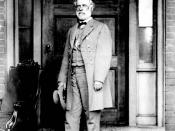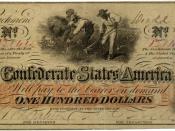The Civil war was the most momentous and crucial period of time in the history of America. Not only did this war bring an end to slavery but also paved way for numerous social and political changes. The country had already been torn by the negative trend in race relations and the numerous cases of slave uprisings were taking their toll on the country's political and social structure. The country was predominately divided up into 3 sections, the North, the South, and the West. Each of these groups had different fundamental interests. The North wanted economies depending on farming, factories and milltowns, while the West relied on expansion and development of land for farming and new towns. The South mainly relied on agriculture like tobacco, cotton, wheat or slaves and a cotton gin. While slavery is cited as the most common cause of the Civil War, it is believed that there were several other factors involved.
In other words, though slavery was the major cause it was certainly not the only cause.
States rights through slavery was the major cause of the Civil War, it was the issues of states rights that played the most important role. It was believed that all these 13 colonies would get equal representation in Congress and all these states were also seeking autonomy so they could at least make decisions regarding their internal matters. Both these things became impossible. While the states were granted some rights, it was declared in the Constitution that central government would be allowed to interfere in any important matters and its authority wouldn't be questioned. Such articles in the constitution naturally gave alot powers to the central government, which created a rift between the states and the government. The minimum powers granted to states proved quite ineffective in appeasing...



Well researched
Your analysis is in depth and easy to follow. Not only are facts present, but there is also good commentary. Overall, a very comprehensive essay.
2 out of 2 people found this comment useful.